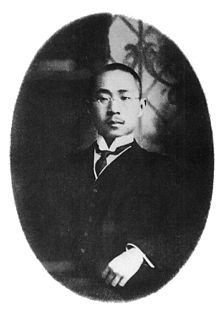Zhu Zhixin | |
|---|---|
| 朱執信 | |
 | |
| Born | 12 October 1885 |
| Died | 21 September 1920 (aged 34) |
| Nationality | Chinese |
| Occupation(s) | Revolutionary and author |
| Known for | First Chinese translation of The Communist Manifesto |
Zhu Zhixin (simplified Chinese: 朱执信; traditional Chinese: 朱執信; pinyin: Zhū Zhíxìn; Jyutping: Zyu1 Zap1 Seon3; 12 October 1885 – 21 September 1920) was a Chinese revolutionary author and close colleague of Sun Yatsen. He was a member of the Tongmenghui. Zhu made a name for himself for a series of written debates with reformist Liang Qichao, where he advocated a single land tax, revolution against the Qing dynasty, and the establishment of a Chinese republic.[2][1] In 1905 he provided the first Chinese translation of Karl Marx and Friedrich Engels's The Communist Manifesto.[3] In 1918 he decided to forgo further military affairs and follow cultural and ideological pursuits. Zhu was a gifted writer and polemicist known among other writers.[4] Zhu and Liao Zhongkai helped Sun Yat-sen negotiate an alliance with the Soviet Union in 1920, eventually giving rise to the First United Front.[5] After his untimely death in 1920, Wang Jingwei helped establish the Zhixin Memorial School in Guangzhou.[4]
On 14 May 2021, asteroid 256698 Zhuzhixin, discovered by astronomers Quanzhi Ye and Hung-Chin Lin with the Lulin Sky Survey in 2008, was named by the Working Group for Small Bodies Nomenclature in his memory.[6]
- ^ a b Sun, Wenxue; Qi, Haipeng (2021). History Of Chinese Thoughts On Public Finance, Volume A. World Scientific Publishing Company. pp. 771, 774. Retrieved 8 August 2023.
- ^ Kurtz, Joachim (2011). The Discovery of Chinese Logic. Boston: Brill. pp. 260–261. Retrieved 8 August 2023.
- ^ Pons, Silvio; Smith, Stephen A., eds. (2017-09-21). The Cambridge History of Communism (1 ed.). Cambridge University Press. doi:10.1017/9781316137024. ISBN 978-1-316-13702-4.
- ^ a b Vol I Howard L. Boorman, Richard C. Howard Joseph K. H. Cheng, Biographical Dictionary of Republican China (New York: Columbia University Press, 1967): 440-443.
- ^ Pantsov, Alexander (2013). The Bolsheviks and the Chinese Revolution 1919-1927. New York: Routledge. p. 46.
- ^ "WGSBN Bulletin Archive". Working Group for Small Bodies Nomenclature. 14 May 2021. Retrieved 16 May 2021. (Bulletin #1)
